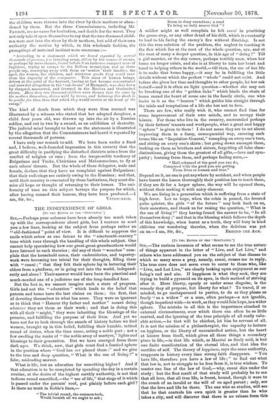THE INDEPENDENCE OF GIRLS.
[TO THE EDITOR OF THE "SPECTATOR.
SIR,—Perhaps your columns have been already too much taken up with the correspondence about girls, but I venture to send you a few lines, looking at the subject from perhaps rather an " old-fashioned " point of view. It is difficult to suppress the smile which arises as one listens to the " nineteenth-century" tone which runs through the handling of this whole subject. One cannot help speculating how our great-great-grandmothers would have listened to such theories ; did any of their " wenches " com- plain that the household cares, their embroideries, and tapestry- work were becoming too trivial for their thoughts, filling them with " ennui ; " that they felt their sphere lay in lecturing their' elders from a platform, or in going out into the world, independ- ently and alone ? Their answer would have been the practical and much-needed one of a judicious use of the long-handled fans.
But the fact is, we cannot imagine such a state of progress. Girls had not the " education " which leads to the belief that parents and home have the last claims on them ; the first, that of devoting themselves to what has none. They were so ignorant as to think that " Honour thy father and mother" meant doing whatever they set them as their work ; and that in doing this with all their " might," they were inheriting the blessings of the promise, and fulfilling the purpose of their lives. And yet we have not far to look through the annals of history before we find women, brought up in this belief, fulfilling their humble, retired round of duties, when the time came, acting a noble part ; not a few swelling the ranks of " the noble army of martyrs," lights and blessings to their generation. But we have emerged from these dark ages. We think, now, that girls must find a fancied sphere in the position where " God has not placed them ;" and we give to the true and deep question, " What is the use of living ?" a false, misleading answer.
What is life, but an education for something higher? And if that education is to be completed by spending the day in a certain routine, at the desire of the highest earthly authority, is not that tedious round sanctified,—the " use of life," that stage of it which is passed under the parents' roof, put plainly before each girl ? Is there no truth in Keble's lines,— " The trivial round, the common task, Would furnish all we ought to ask;
Room to deny ourselves; a road To bring us daily nearer God "?
A soldier might as well complain he felt ennui in practising- the goose-step, or any other detail of his drill, which is eventually to lead to his facing the enemy's fire without flinching. Is not this the true solution of the problem, the neglect in teaching it the flaw which lies at the root of the whole question, aye, and at- the root of many a deeper question, in this age of " doing ?" Till a girl marries, or the day comes, perhaps terribly soon, when her- home no longer exists, and she is at liberty to turn her heart and hand to helping others in the world,—till then, the use of her life- is to make that home happy,—it may be in fulfilling the little details without which the perfect " whole " could not exist. And before she gives her time and thoughts to other people, let her ask herself—and it is often no light question—whether she may not be breaking one of the "golden links" which binds the chain of home round the heart of some one in the family circle, one who- looks to it as the " beacon" which guides him straight through- the trials and temptations of a life she has not to face.
There are few, who really wish it, who cannot find time for some improvement of their own minds, and to occupy their leisure. For those who live in the country, surrounded perhaps- by their fathers' tenants and workpeople, what a great and happy " sphere " is given to them ! I do not mean they are to set about improving them in a fussy, consequential way, entering each house like an "Inquisitor-General," trampling on every one's toes,. and sitting on every one's skirts ; but going down amongst them, looking on them as brothers and sisters, forgetting all false class- distinctions, giving them the greatest of all gifts,—love and sym- pathy; learning from them, and perhaps feeling soon,-
" Half-ashamed of the good you can do, Compared with the good you are getting From lives so human and true."
Depend on it, no one is put anywhere by accident, and when people- have learnt the lesson thoroughly their position has to teach them,. if they are fit for a larger sphere, the way will be opened them,. without their seeking it with noisy clamour.
We are living in a generation which is suffering from a state of high fever. Let us hope, when the crisis is passed, the fevered pulse quieter, the girls " of the future " may look back on us,. their ancestors, and thank us for raising the question, " What is- the use of living ?" they having found the answer to be, "In all themselves deny ;" and that in the blessing which follows the depth of this knowledge, when learnt as a truth, they will bury in kind oblivion our wandering theories, when the delirium was yet.


































 Previous page
Previous page